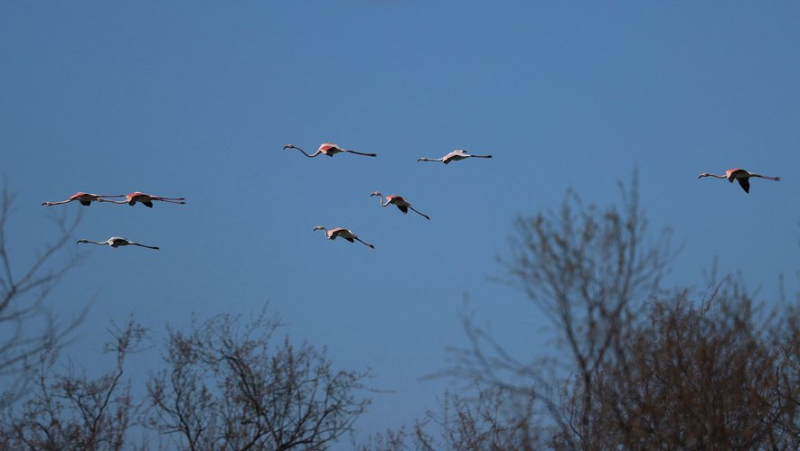Global warming, human activities… why migratory birds are deserting the Albanian sky ?

Albania is located on one of the main migration routes between Europe and Africa. A long and perilous journey, essential to their survival. Adnan Beci/AFP
The Vain Lagoon, its wild nature, its unique biodiversity, is a small Garden of Eden nestled in Albania. But migratory birds, regular passengers in the Albanian sky, are deserting it: paradise is becoming too hot.
Albania is located on one of the main migration routes between Europe and Africa. A long and perilous journey, essential to their survival. The Vain lagoon, more than three thousand hectares facing the Adriatic Sea, is home to 196 species of migratory birds which leave each year in search of sun and food.
Among them, fascinating flamingos with bright pink plumage, black-headed gulls, slender and elegant, egrets, coots, whistling ducks and even teals ;winter who, with their raspy cries, sing a concert early in the morning that breaks the silence of the place.
But from year to year, their number declines. At least 40% were missing in January, according to the latest census. For several years, the mallard duck has no longer frequented Vain.
Victims of poaching, poisoning, collision with power lines, loss of their natural habitat, exposed to numerous dangers, migratory birds die every year by the thousands.
"The reasons are multiple but it's above all global warming which has disrupted migration and breeding seasons"< /em>, estimates Kreshnik Toni, one of those responsible for protected areas in Lezhë. Warming, fishermen believe, has caused the number of fish in the lagoon to drop, and is depriving birds of food.
"Water temperatures, rising sea levels and other factors have led to declining stocks of fish that are a food resource for birds& ;quot;, laments Nikolle Lucaj, who has been fishing here for 35 years. Once abundant, the population of eels, a good prey for birds, has been reduced by 80%.
Like wolves and red mullets, they have been replaced by the blue crab, native to the western Atlantic and a real threat to the biodiversity of these places. "They attack birds and they are very aggressive even towards flamingos", explains Mr. Lucaj, with a bitter smile.
Pollution, degradation, even destruction, of their habitat by human activities also constitute a very significant risk, warns Mirjan Topi, author of the first guide to Albania's birds. A young stork equipped with a GSM allowing its migration to be followed in real time died last year in Greece after hitting an electricity pole.
Chad-Albania
Certain birds such as white storks, an endangered species, spent less time in Africa this year and returned much earlier than expected to Albania.
For the seventh year in a row, two storks who have a long love affair have returned to their nest, built on a roadside electric pole.
"But another pair of storks preferred to spend the winter in Albania rather than take the risk of a long and perilous migration to Africa"< /em>, says Taulant Bino, who chairs the Albanian Ornithological Association (ASO). Albanian ornithologists, worried, are also impatiently awaiting the return from Chad of an Egyptian vulture, equipped with a GSM.
The sacred bird of the pharaohs, in danger of extinction worldwide, "is exposed to a lot of danger during this journey of more than 5,000 km across three continents", explains Ledi Selgjekaj, biologist with the organization for the protection and preservation of nature in Albania (PPNEA) .
The European population of the Egyptian vulture alone has fallen by 50% since the 1970s. In the Balkans, it has declined by 80% over the past 30 years. In Albania, there are only five couples left. To preserve them, the ornithological associations of Albania and Greece have built secure sites aimed at eliminating threats during reproduction.
"No country can fight the battle alone, climate change and the risks that migratory birds face during their journeys are a global problem" , warns Mr. Bino. They are crossing borders, and an international effort is the only way to ensure their survival, Albanian experts warn.




